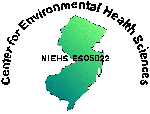Environmental Health Effects of WTC
The explosion and collapse of the World Trade Center (WTC) was a catastrophic event, producing an aerosol plume that impacted many workers, residents and commuters after September 11, 2001.
Scientists and clinicians from institutions of higher learning located within the greater metropolitan New York City area were on-site immediately following the attacks on the World Trade Center. Collectively, these professionals devoted their efforts to addressing the immediate health concerns of individuals living and/or working in the area, as well as the courageous men and women involved in the rescue and recovery efforts.
While the debris is cleared away and plans for rebuilding are being discussed, the concerns regarding future health issues resulting from September 11th are at the forefront of study, specifically on people living and/or working in the tri-state area (Connecticut, New Jersey and New York).
This website will focus primarily on WTC environmental health research; future topics and links may include terrorism, bioterrorism, and psychological effects of September 11th.
Please contact us with your concerns and/or questions. We will attempt to answer each inquiry, incorporating the most frequently asked questions/responses into the FAQ section.
 This website is made possible through the National Environmental Health Sciences Institute (NIEHS), Grant No. ES05022-15S1. It is administered by the Community Outreach and Education Program (COEP), an outreach component of the NIEHS Center of Excellence housed at the Environmental and Occupational Health Sciences Institute (EOHSI), in Piscataway, New Jersey, and the UMDNJ-School of Public Health.
This website is made possible through the National Environmental Health Sciences Institute (NIEHS), Grant No. ES05022-15S1. It is administered by the Community Outreach and Education Program (COEP), an outreach component of the NIEHS Center of Excellence housed at the Environmental and Occupational Health Sciences Institute (EOHSI), in Piscataway, New Jersey, and the UMDNJ-School of Public Health.
For more information: Phone: 732-445-0220/0110
Email: wtcoutreach@eohsi.rutgers.edu



